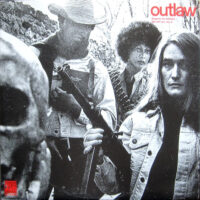
Eugene McDaniels’ outré political-protest-album era was short, but yielded two classics: 1970’s Outlaw and 1971’s Headless Heroes Of The Apocalypse. These records deviated from his previous output as a relatively conventional R&B singer, becoming treasure troves of samples for hip-hop producers and earning love from counter-culture types, too. His rabble-rousing 1969 anthem “Compared To What” was turned into a hit by Les McCann and Eddie Harris, and it somewhat foreshadowed Outlaw. By 1975, though, McDaniels was in full-on loverman mode with Natural Juices. While Headless Heroes has been sampled more and garnered more critical accolades, Outlaw is just as powerful an artistic statement.
To achieve this lofty work, McDaniels enlisted elite session players Ron Carter (bass), Hugh McCracken (guitar), Eric Weissberg (guitar), Ray Lucas (drums), and Buck Clarke (percussion), plus musical director Williams S. Fischer. This team served as exceptional facilitators of soulful, rock-oriented ballads and occasional forays into funk and gospel. Eugene threaded the needle with songs that double as fascinating character studies and trenchant sociopolitical commentary.
“Outlaw” portrays rebellious women who don’t wear bras nor fry their hair, but rather live with nature and not with the law. Surprisingly, “Outlaw” sounds like one of those elegantly stumbling, blues-rock gems from the Rolling Stones’ Beggars Banquet. “Sagittarius Red” offers more Stones-like balladry, flaunting McDaniels’ vast range and emotional depth as a singer, a rich combo of soulfulness and rock bravado.
“Welfare City” is an absolutely joyous ode to flouting convention, hanging out with the kids in Washington Park, and smoking joints. It’s powered by a total earworm of a melody that moves in huge, sugary loops and possesses some of the most infectious “yeah yeah yeah”s and “la la la”s. The gospel intro of “Silent Majority” gives way to a lean, staunch protest song that gathers strength with each passing bar. The guitar interplay between McCracken and Weissberg glints and coils with glorious tension in a tune that’s a perfect merger of Shuggie Otis and Phil Ochs. The song segues seamlessly into “Love Letter To America,” a devastating condemnation of the USA. “Hey, America, you could’ve been a real democracy/You could’ve been free/You could have had me for your friend and not your enemy/The only thing you can respect is violence now/You lost the gift of love, don’t ask me how.” McDaniels renders this brilliant concept with tough tenderness.
In “Unspoken Dreams Of Light,” McDaniels loquaciously castigates the genocide of indigenous peoples (called “Indians,” in the parlance of the time) to a backing in which heartfelt balladry and incisive jazz-funk alternate. It’s a fantastic roller-coaster ride. With its über-funky opening drum break, “Cherrystones” unspools into a low-lit, laid-back charmer in which McDaniels sarcastically lambastes greedy, apolitical assholes. Reminiscent of the sidewinding seductiveness of the Rolling Stones’ “Stray Cat Blues,” “Reverend Lee” relates a tale about a clergyman who succumbs to the fleshly temptations of “Satan’s daughter.” The album closes with “Black Boy,” a trembling ballad in which McDaniels shows the rare ability to simultaneously project vulnerability and strength.
On the record’s back cover, McDaniels wrote, “under conditions of national emergency, like now, there are only two kinds of people—those who work for freedom and those who do not… the good guys vs. the bad guys.” Evergreen truth. -Buckley Mayfield
Located in Seattle’s Fremont neighborhood, Jive Time is always looking to buy your unwanted records (provided they are in good condition) or offer credit for trade. We also buy record collections.


